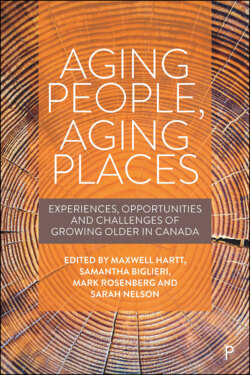Читать книгу Aging People, Aging Places - Группа авторов - Страница 5
На сайте Литреса книга снята с продажи.
ОглавлениеList of figures and tables
Figures
1.1 Canada’s urban population by region and age
2.1 Examples of pictures from each community and for each theme
4.1 Study area and walkability audit results
4.2 Examples of street features increasing (a, b, d, f) or decreasing (c, e) the walkability audit index in Montréal and Lille
4.3 Tracking paths for pedestrians in Lomme-Lambersart and Wazemmes
6.1 Canada’s suburban population by region and age
9.1 E-bike models used in the study
9.2 E-trike pedestrian interaction on multi-use trails
9.3 E-bike rider at a busy intersection along a multi-use trail
11.1 Canada’s rural population by region and age
14.1 Making baby quilts
14.2 Sharing pictures and stories
16.1 Proportion of the population aged 14 and under and 65 and over by Indigenous identity
Tables
Int.1 Age-friendly domains and a selection of key factors
1.1 Number of Canadian urban residents by age, low income, immigrant neighbourhood, and foreign language neighbourhood
4.1 The MAPISE walkability audit dimensions, indicators and characteristics per street segment and crossing
4.2 Proportion of street segments according to their walkability audit results
4.3 Differences in proportion between tracking paths and audit street segments according to their walkability results in Lomme-Lambersart and Wazemmes
6.1 Number of Canadian suburban residents by age, low income, immigrant neighbourhood and foreign language neighbourhood
11.1 Number of Canadian rural residents by age, low income, immigrant neighbourhood, and foreign language neighbourhood
14.1 Participant profiles (n=10)
